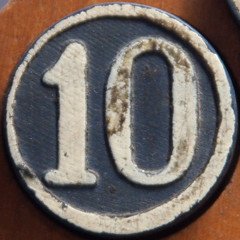10 Winning Tournament Poker Tips Image by Leo Reynolds via Flickr
Image by Leo Reynolds via Flickr
I have been asked to provide some more tips based on my recent run to the final tables at the Oaks, so here goes:
1. Be Aware at the TableIn the early rounds of an event, you are going to run into more average players. Later on, you will run into the better players. in any event, be aware of your opponents playing styles.
I know many people use the tight/loose and aggressive/passive labels on players. I think those are fine, but I like to think in more than two dimensions.
Look at the cards players show when they are in hands, and figure out how they play based on what happened. Some players will push all-in with draws, while others will only do so with the nuts or near nuts. Some players overplay their cards and push all-in with top pair. Other players go on tilt after a bad loss. Also, learn what those big pre-flop raises for each player.
You don't need to see a hand to learn playing styles. Does a player bully an opponent in the blinds when heads up pre-flop? Or, is a player raising too often to have a big hand each time?
This information is vital since it leads to who you can and can not make a move against when the situation is right (more on this later).
2. What is Your Table ImageRealize that later in the event when you are playing against observant opponents, you have a table image. Take advantage of this image combined with what you've observed of how your opponent plays his hand.
Example:
It's down to two tables. There are 6 players at your table. Everyone folds to the player in the small blind, who raises your big blind 2.5 times. You look down to find 9s-6s. Not a good hand and an easy fold right? Wrong!
What is the situation here? You know this player made the same play against you the last round. You know this player sees you as a very tight player. If you fold, you are going to be at a dangerously low level of chips. If you push all-in, your opponent will be risking most of his remaining chips. And if he folds, he can afford to lose the chips he raised, and still have enough chips to compete.
The situation calls for a move all-in. Your cards don't matter as much as the situation.
3. What is the Situation?This really has been the key for me in my play. I have been waiting for the right situation to make the right play. The move to make is based on the players, my table image, the chips, the stage of the event, and finally the cards.
The key is not to miss out on these situations when your cards are weak, but the situation is right.
Most players think they know the situation when they have premium cards, "I have pocket Jacks, time to raise." But, there is a lot more to the right play than knowing your hand.
4. Put the Pressure on Your OpponentWhen you have a good or great starting hand, ask yourself how to put pressure on your opponents?
A typical example is early in the event, when 4 players limp in, and you are on the button with Ks-10d. Most players will call and hope for a good flop. That is a mistake.
What is the situation? Have your opponents called big raises after limping or have they have been folding? Has a player been limping with premium cards? How has the table been playing? If your opponents have been folding, this is a good situation for a big raise. You are not in a blind so they won't think you are trying a steal.
Another example is when you hold a hand like pocket pairs. A player in early position makes a standard 3x the big blind raise. Another player calls. You have pocket 9's in the cut-off. What should you do?
What's the situation? There is no standard answer. Has the player upfront been raising too much or not at all? What about the caller? Is he setting up a trap? What is the chip situation? What about the players behind you? There are reasons to dump this hand and there are reasons to put in the squeeze play. If you've been paying attention, you will have a good idea how your opponents play and what to do here.
5. Raise or FoldA great limit poker concept is to raise or fold. It is one you should consider for playing tournaments.
I know that it feels safer to call pre-flop, but when you have a playable hand it may be time to raise or fold.
An example was the last hand when you held those pocket 9's. It may be one of those raise or fold situations. If those two opponents and you had huge chip stacks then a call seems reasonable. But, even then, a big raise can make your opponents fold a hand like A-Q or K-Q or even pocket Jacks.
Another example is the one where there were 4 limpers and you held K-10 offsuit. Think "raise or fold." Don't auto-call. Calling gives you just one way to win.
6. Misplaying Small and Medium PairsI hear this at poker tournaments all the time" "Those small pairs are killing my stack." A player has been getting small pocket pairs, raising upfront, and having to fold to big re-raises. So he complains.
The pairs are not killing his stack, his poor decision-making is hurting his stack.
Yeah, sets are great hands when you hit them but it doesn't happen often. You want to play the small pairs to win big pots.
Example:
You are at a 10 handed table, and get pocket 4's in early position. What should you do?
What is the situation? If the table has been limping pre-flop in these early rounds, then limp. If the table has seen players raising pre-flop a lot, then just fold. Should you raise in this situation? Doesn't seem like a smart move to me. What will you do if you get re-raised? What will you do if you get called and you miss on the flop? Throw off more chips?
Example:
You have pocket 7's in the cutoff. A player upfront raises and gets called by another player in early position. What should you do?
Again, assess this situation. Both players have a big stack. You have a big stack. You are in a back position. A call here is a reasonable play since you have an opportunity to win a big stack if you hit.
What if both players had a medium or small stack? In this situation, I would have no problem in folding my 7's. Even if I hit, I am not going to win enough to make a real difference in my standings.
What about pushing all-in against these players here?
That play makes no sense since you have players behind you, and you are most likely going to be putting yourself in a coin flip situation.
7. Don't Lose Your Patience.Relax. Everyone goes card dead. If you are being observant, you will often find situations where your cards don't matter.
If it is late in the event, you can use Harrington's M as a guide. My belief is that his M is a good guideline, but that finding the right situations are better so you have enough chips to do damage to your opponent.
As a rule, look to be the first player to make a raise or move all-in. Avoid being a caller of a player who has made the first raise/all-in.
8. Tough Decisions: It's Better to Have Two Ways to WinThere are going to be tough decisions during a tournament. Sometimes you need to be guided by the concept of having two ways to win: Making that play to put pressure on your opponent to fold or if called, making a better hand.
Other times, of course, you have to just push your chips in and hope for the best.
9. Manage your ChipsThis is key and yet I think it is an after thought by many players.
Example:
It's the final table. You have $80,000 in the $2,000 big blind and one player moves all-in for all his chips, or $6,000. It doesn't matter what you have. You must call.
Seems simple enough, but last week I witnessed this big blind folding. I was in shock. But no one at the table (except the all-in player) even noticed this awful non-call.
Example:
A tight player under the gun moves all-in. Another tight player calls all-in. You have As-Ks. If you call here and you lose, your stack will be crippled.
What should you do?
If you are low in chips, I would not hesitate to call. If I had enough chips to make some moves, I would fold.
This happened on Sunday, and the player crippled his stack by calling with As-Ks. The first player had Q-Q, the second had A-K offsuit. It was a play he did not and should not have made.
10. Don't Get UnluckyI haven't figured out how to avoid being unlucky. The only thing is that I don't mind being unlucky one time near the start at the event, if it doesn't cripple my stack.
I hope these 10 winning poker tournament tips help you at your next poker tournament. Good luck!
 Image via Wikipedia
Image via Wikipedia![Reblog this post [with Zemanta]](http://img.zemanta.com/reblog_e.png?x-id=3173b2d9-e2c7-40c3-aace-d7a050c3e913)

![Reblog this post [with Zemanta]](http://img.zemanta.com/reblog_e.png?x-id=0cb498f7-5036-4cb9-80c3-ae3270a68700)

![Reblog this post [with Zemanta]](http://img.zemanta.com/reblog_e.png?x-id=69569d0e-e13c-4212-9a78-efffd9cce46a)

![Reblog this post [with Zemanta]](http://img.zemanta.com/reblog_e.png?x-id=afe88743-fe7e-4b78-82e9-38a486b7b633)

![Reblog this post [with Zemanta]](http://img.zemanta.com/reblog_e.png?x-id=cc524677-780c-4a84-b89d-947f56a5a6b9)

![Reblog this post [with Zemanta]](http://img.zemanta.com/reblog_e.png?x-id=bf526229-4d55-4223-bdab-c3c880e9df77)

![Reblog this post [with Zemanta]](http://img.zemanta.com/reblog_e.png?x-id=9a13903a-c1ec-41a4-b03e-7094d64d9fc8)

![Reblog this post [with Zemanta]](http://img.zemanta.com/reblog_e.png?x-id=e76a63a3-0602-4b82-b70d-d7e82f923a62)







